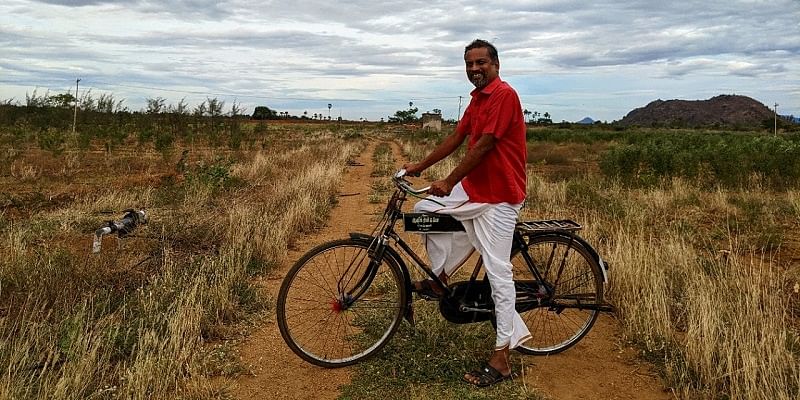Nestled at the foothills of the Western Ghats, about 650 kilometers from Chennai is Mathalamparai, a tiny village in Tenkasi district in Tamil Nadu. With a population of a little over 2,000, it might not be your typical location to house a software major. But with his current Twitter location tagged at Tenkasi, Zoho Corporation’s Indian entrepreneur, founder and CEO Sridhar Vembu has been on a mission to redefine the term ‘headquarters’.
Zoho’s foray into rural India began when the Chennai-headquartered software products firm began operations from Mathalamparai. Termed the Zoho Experiment, this has been Vembu’s initiative to enable his employees to work closer to their homes and boost the rural economy. Unlike other tech giants, Vembu drifted away from the philosophy of having standard office headquarters and has been operating from a rural setup since 2019; urging his employees to do the same.

Sridhar Vembu in Tenkasi
The Software as a Service (SaaS) company is currently working on a model to establish ‘feeder offices’ in rural areas with an emphasis on Tamil Nadu. The initial setup has reportedly been quite successful with both the organization and employees doing well on all fronts; the latter has the advantage of being closer to home, thereby striking a work-life balance.
Vembu was awarded the 2019 Ernst & Young Entrepreneur of the Year Award and earlier this year he was honored with the Padma Shri, India’s fourth-highest civilian honor. The Indian entrepreneur was also recently appointed to the National Security Advisory Board (NSAB) of India.
Back to his roots
Born in Thanjavur district to a family of farmers, Vembu graduated from IIT Madras in Electrical Engineering before he went on to do his Ph.D. from Princeton University in New Jersey. Following a brief stint at Qualcomm, he went on to co-found AdventNet in 1996 with his brothers and friends. The company made software products at a time when IT services were the rage. In 2009, the company was renamed Zoho Corp to reflect its transition from a software company to an innovative online applications provider.
Today, Zoho provides cloud-based CRM solutions and over 40 apps in the areas of online accounting, and human resource and inventory management. Having spent considerable time in the US, the Indian entrepreneur lived in and around San Francisco’s Bay Area, before deciding to move back lock, stock, and barrel to India in 2019, just a few months before the outbreak of the COVID-19 pandemic. When the world embraced a work-from-home policy, Vembu went on to embrace the work-from-village mission. The reason behind his decision, which might be a paradigm shift for the IT sector, is subtle yet ingenious.
Emphasizing that talent emerges from rural areas, 54-year-old Vembu asserts that this transition will have people working globally; from villages. The bigger picture: more opportunities for people to work from a single location while catering to global requirements. Currently, Zoho has two rural offices — Tenkasi and Renigunta in Andhra Pradesh. In an interview with Forbes India, Vembu said his motivations to go rural are two-fold,
“One, I want my employees to live in these villages because it brings a lot of cross-fertilization of ideas.”
Second, Vembu hopes that the city folk will be able to pitch in with mentoring and coaching the local youth who can then be recruited by Zoho. “It would be a two-way exchange here…”
In addition to his regular work, Vembu also does his bit for the village: he has been teaching Maths and Science at a local school. The Indian entrepreneur opines that such a lifestyle i.e., teaching, farming, and other village-related activities, can enable people to re-connect with their roots. Vembu himself is finding his way back to his old ways. A typical day for him begins with early morning calls to his US offices, before he sets off for a long walk, occasionally taking a dip in the village well apart from spending some time farming.
Life is worth living for these moments! pic.twitter.com/HoTaaaWqrh
— Sridhar Vembu (@svembu) May 23, 2021
Plans for feeder offices
Indian entrepreneur Vembu and his team are working on replicating the concept of feeder offices not only in India but also at Zoho’s offices in the US, Mexico, and Japan. This nascent concept of ‘work-from-village’ has proved to be a well-calculated gamble as the employees of Zoho have managed to develop the latest offering i.e., customer service software – Zoho Desk. Incidentally, Zoho was one of the first software product unicorns. In 2019 Forbes valued Vembu’s 88% stake at $1.83 billion. The company has over 50 million users globally for its apps.
With its headquarters in Chennai, Zoho Corp is focusing on providing seamless services to clients, irrespective of office locations. Once the work in the first 10 villages is underway, the company plans on implementing similar models in Kerala and Andhra Pradesh. If successful, it could be replicated across other companies as well.
Sridhar Vembu on Twitter
Rural India, despite so much poverty, offers a sense of belonging and rootedness. The result is low crime.
The reason is traditional religious faith.
Even as we lift ourselves up economically, I want to nurture the roots of our culture and the faith that sustains life. 🙏
— Sridhar Vembu (@svembu) June 19, 2021
It is best not to burden our efforts with expectations. When we act with resolute will, the universe opens doors but our prior expectations get in the way of us recognizing those open doors.
— Sridhar Vembu (@svembu) June 7, 2021
